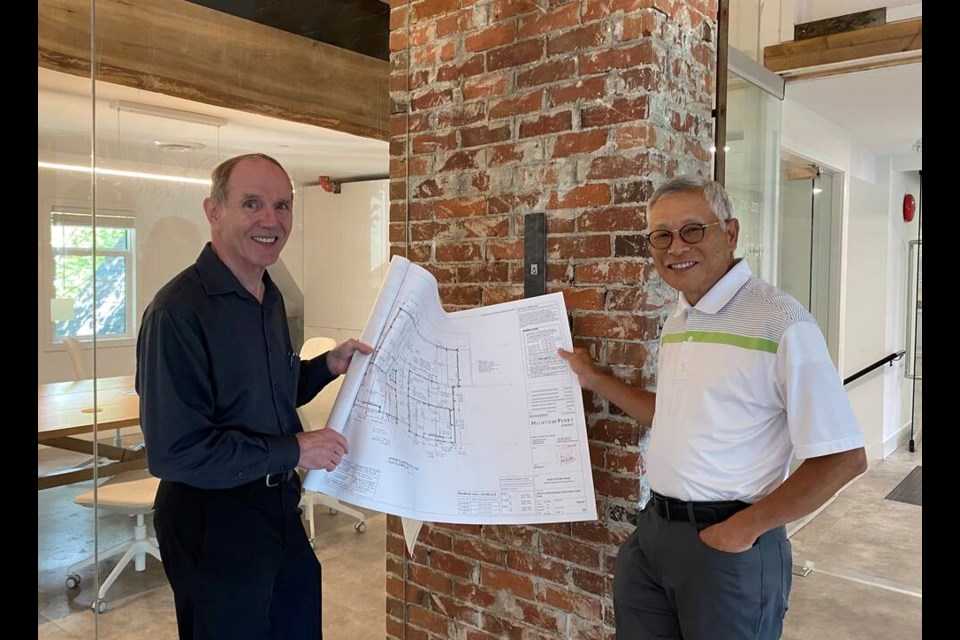A Port Moody company is hoping to transform B.C.’s housing construction industry with pre-fabricated homes made of mass timber.
With the demand for housing at a crisis point in Metro Vancouver, Massive Canada hopes a new $75 million plant in Williams Lake will produce housing quickly and efficiently while reducing waste, construction time and building costs.
“We are focusing on mass timber for mass markets, we want to sell 100 townhouse units at a time,” said Gaetan Royer, CEO of Massive Canada, who expects the business to start manufacturing in early 2024.
Located at 2414 St. Johns St. in the historic Burrrard Hotel building, Massive Canada’s wood-focused business hearkens back to Port Moody’s days as a shake and timber mill town.
Building homes like Lego blocks out of engineered wood seems like a technology of the future, but mass timber is not entirely new to the Tri-Cities.
In fact, Adera Development has completed a number of residential buildings using mass-timber construction and is building two six-storey rental and market homes, including Sol, at the corner of Como Lake and Robinson Street in Coquitlam utilizing the engineered wood product.
A 12-storey mass timber rental building in Coquitlam is also being considered.
Still, it’s a relatively new construction material but Royer thinks it will be a game-changer at the mass production level.
Once fully up and running, Massive Canada will be able to produce fully detailed modular units, including windows, electrical and plumbing, in its manufacturing plant, located in Williams Lake.
So far the B.C. government likes what it sees.
Recently, Premier David Eby visited the Williams Lake plant and handed over $10 million in start-up funding for the new business, through the province’s $180-million BC Manufacturing Jobs Fund.
And this week, the B.C. government announced $4 million for 12 new mass-timber demonstration and research projects.
Local jobs for B.C. workers
For Massive Canada, the plan is to create as many as 70 jobs in what will be a high tech plant in the northern B.C. city where workers will build homes on an assembly line instead of a construction site.
Units will be transported and craned into place, depending on the configuration, with the company focusing on townhouses and apartments up to six storeys, and eventually, 12 storeys.
“To go higher than 12 storeys becomes more of a custom design, we’re going to be doing that, I know a year from now. Our focus right now is to enter mass markets to serve as many developers and their projects as possible,” said Royer.
Royer is not the only business leader bullish on mass timber.
Rocky Sethi, COO at Adera Development Corporation, told the Tri-City News his experience with mass timber construction, using his company’s SmartWood technology, suggests more buildings will be constructed using mass timber.
And he’s supportive of another company getting into the mass timber construction business.
“We welcome more local manufacturing of mass timber products, for sure,” said Sethi.
“It’s quieter, it’s faster and it’s more sustainable… I only see it taking a larger and larger market share, we are getting fantastic feedback from residents in the buildings,” said Sethi.
One of the advantages is that mass timber reduces noise, like concrete, and fire safety ratings are high.
Mass timber doesn’t produce greenhouse gasses like concrete and minimizes waste because components can be built to specification.
For Royer, the environmental benefits of mass timber construction, and the need to find a way to build more affordable housing, is what drew him to the business.
Royer said Massive Canada’s mass timber buildings can even be moved and reused while modular construction can provide efficiencies over traditional construction.
The company is building a six-storey rental building in Gibsons, currently in the approval phase, which will be an example of Massive Canada’s manufacturing and construction process, Royer said.
“BC Housing needs to build thousands of homes,” he said. “We’re helping to resolve the housing crisis, and not just in Metro Vancouver.”




